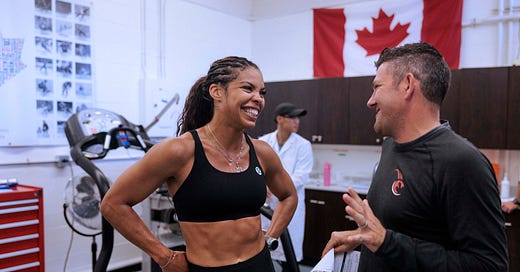Getting Back to the Plot: Baseline Health
Establishing your health foundation before chasing perfection
As I reflect on the health optimization trends flooding our social feeds, I find myself drawn to a more fundamental truth about wellness.
I didn't anticipate my first Substack of the year to be a call-to-action for preventive care, but it feels fitting during a time of unpredictability and uncertainty. Taking control of our individual health provides a sense of agency, and as we step into the third month of the year, it's a sentiment that resonates particularly strongly. Amidst the chorus of "spring renewal" aspirations echoing across social media:
Complete my first Hyrox
Run a marathon
Get 10,000 steps per day
Dry-January…and beyond?
Drink a gallon of water a day
Stick to a journaling routine
Commit to 75-hard
All of which coupled with the social media-defined, “health optimized morning routine”:
Morning sunlight. Green juice. Gratitude journaling. Cold plunge. Sauna. Red light therapy.
Obviously.
The rise of health optimization, defined by InsideTracker, the “ultra-personalized nutrition” blood biomarker analysis system, as “implementing targeted protocols to help you operate at your greatest level—physically and mentally.” has become the desired gold-standard, optically, of daily health and self-care regimen. Driven by science-backed research, touted by privileged social media creators/influencers. “Privileged” here meaning those with extra cash, access to resources, plenty of free time, and the mental bandwidth to think beyond basic care while chasing that elusive "best self."
But how can anyone become their best self or dream up "Future You" if they don't even know where they're starting from? A baseline must be established before, and in order to, reap the benefits of optimization.
On a spring morning in May 2019 in Cleveland, OH—three years after my dad's unexpected passing (heart attack) and as my mom's cancer returned (spreading to her bones and liver, later reaching her brain and taking her life three years after)—I connected with an acquaintance deep in the health and longevity space. The conversation turned to my concern about not knowing my family health history and, honestly, not knowing my own situation either.
My parents never talked about their health until I started receiving calls from their doctors or, in my dad's case, that knock at my apartment door beginning with three words I'll never forget: "I'm so sorry…". My dad had been found unresponsive on his apartment floor, where he’d been laying for a week. Leaving me to piece together how chronic stress, poor diet, lifestyle choices that didn't serve them, lack of community support, and the heavy burden of the "Black Man in America" and "single Black mother" experiences contributed to losing them too soon—a heartbreaking mystery I never wanted to solve.
For years, I thought maybe "knowing" scared my parents when it came to their health. But when I think about how they grew up, the deep-rooted mistrust many Black Americans have toward medical systems, and how asking for help was seen as weakness, I'm not sure fear was the only thing holding them back. What I know for certain? The "unknowing"—and then finding out in the worst possible way, like I did—is so much more terrifying.
So when Kayla Barnes-Lentz , who many know as a health and longevity guru but I was introduced to as the Townhall comms director encouraged me to peek under the hood through comprehensive blood testing, I booked my first Functional Medicine Doctor appointment and made myself a promise: start every single year with full blood panels.
A functional medicine doctor is a healthcare professional who specializes in identifying and treating the underlying causes of chronic diseases. They take a holistic approach, considering the patient's physical, mental, and emotional well-being, as well as their lifestyle factors.
Wellness aesthetic content with perfect lighting and stylish workout sets is undeniably more appealing than photos of blood vials. But when optimization becomes the star of the show, it skips over the crucial foundation of routine, preventative care. This care has somehow been framed as a "nice-to-have" privilege in the U.S. rather than a basic right, usually only accessible through employer insurance. That's a deeper conversation for another day, but for those interested in wellness culture and who it really serves, "Who is Wellness For?" by Fariha Róisín offers valuable insights.
The Case for Baseline Before Optimize
The foundation-first approach makes sense: baseline before optimize. It's about being responsible for your 8-year-old self and looking out for your 80-year-old self at the same time.
To know where you want to go, you need to know where you're starting—in fitness journeys, careers, and especially with health.
So friend, have you scheduled (and actually shown up for) your annual preventative health care appointments this year?
Only asking, and yelling, because I care.
**Preventive care appointments are medical visits focused on maintaining health and preventing illness rather than treating existing conditions. If you’re looking for more information, connect with your healthcare provider or look up a community health center nearby.
These appointments typically include:






